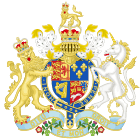Wales and Berwick Act 1746 facts for kids
| Act of Parliament | |

|
|
| Long title | An Act to enforce the Execution of an Act of this Session of Parliament, for granting to His Majesty several Rates and Duties upon Houses, Windows, or Lights. |
|---|---|
| Citation | 20 Geo. 2. c. 42 |
| Dates | |
| Royal assent | 17 June 1747 |
| Repealed | 1 January 1979 |
| Other legislation | |
| Amended by | |
| Repealed by |
|
|
Status: Repealed
|
|
The Wales and Berwick Act 1746 was an important law passed by the Parliament of Great Britain in 1746. This Act officially stated that the country of England included England itself, along with Wales and the town of Berwick-upon-Tweed. Berwick is a town with walls that was often fought over. It changed hands many times before England and Scotland became one kingdom in 1707.
What the Act Did
This law made it clear what "England" meant in other laws. It said that England included Wales and Berwick-upon-Tweed. This rule applied to all laws made before and after 1746. It only changed if a new law said something different.
Berwick had been a royal burgh (a special town) in Scotland for a long time. But the Act confirmed that English law would apply to Berwick, not Scots law. This was important because laws in England and Scotland were different.
The original Act had four main parts, called sections. Only section 3 was about Wales and Berwick. The other sections dealt with things like collecting a window tax. They also allowed Quaker officials to use a special declaration instead of taking an oath. This was because Quakers had religious objections to taking oaths. The short name 'Wales and Berwick Act 1746' was given to the law later. This happened after the other sections were removed.
Why the Act Ended
The Wales and Berwick Act was eventually cancelled. The part about Wales was removed by the Welsh Language Act 1967. The entire Act was then officially cancelled by the Interpretation Act 1978.
A law called the Local Government Act 1972 also changed things. It started on April 1, 1974. This Act clearly said that in future laws, 'England' would include 46 counties, and 'Wales' would have eight counties. Berwick was part of the English counties. This also helped to settle a long debate about whether Monmouthshire was part of Wales or England. The 1972 Act made it clear that Monmouthshire was part of Wales.
See also
 | Roy Wilkins |
 | John Lewis |
 | Linda Carol Brown |

